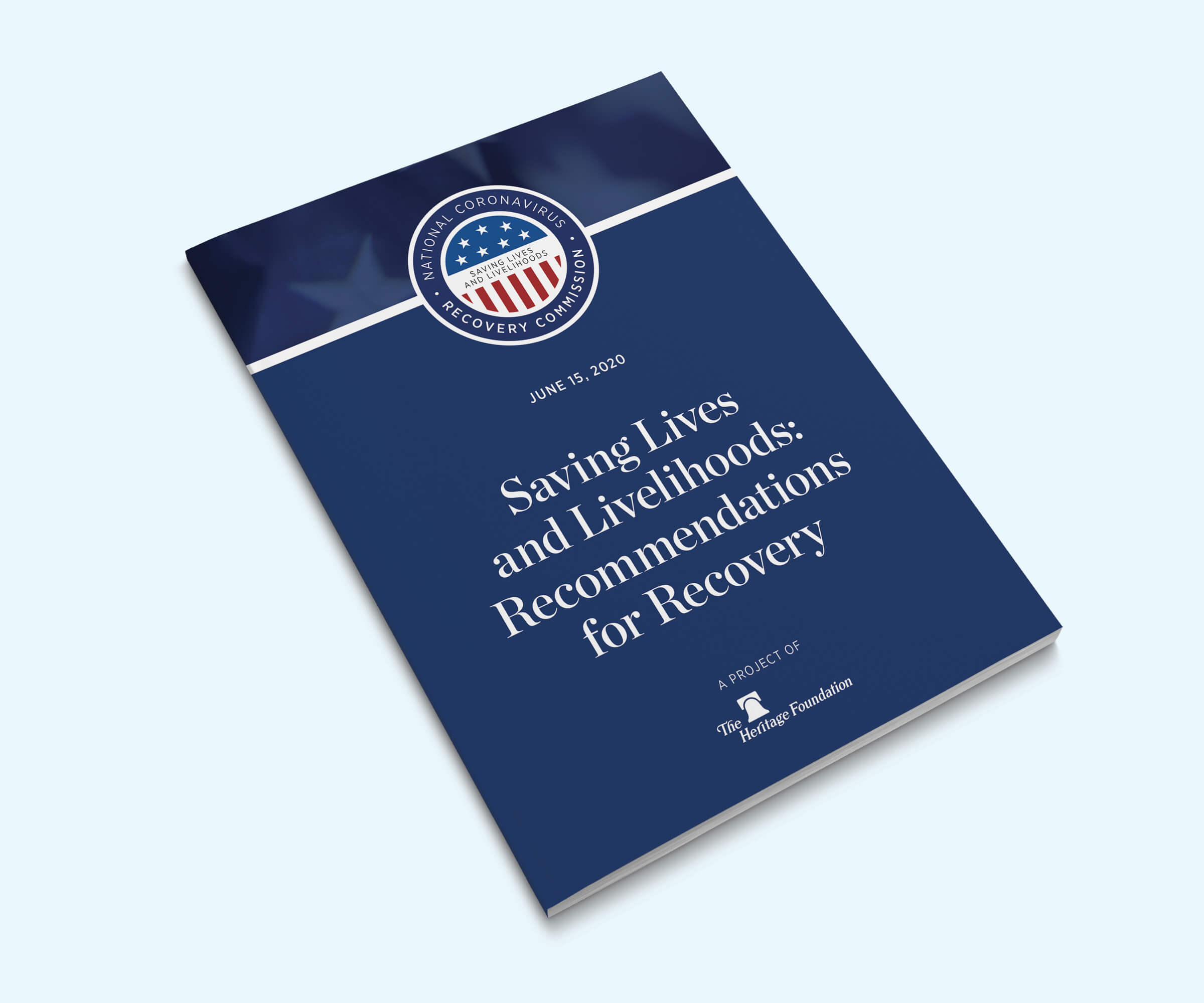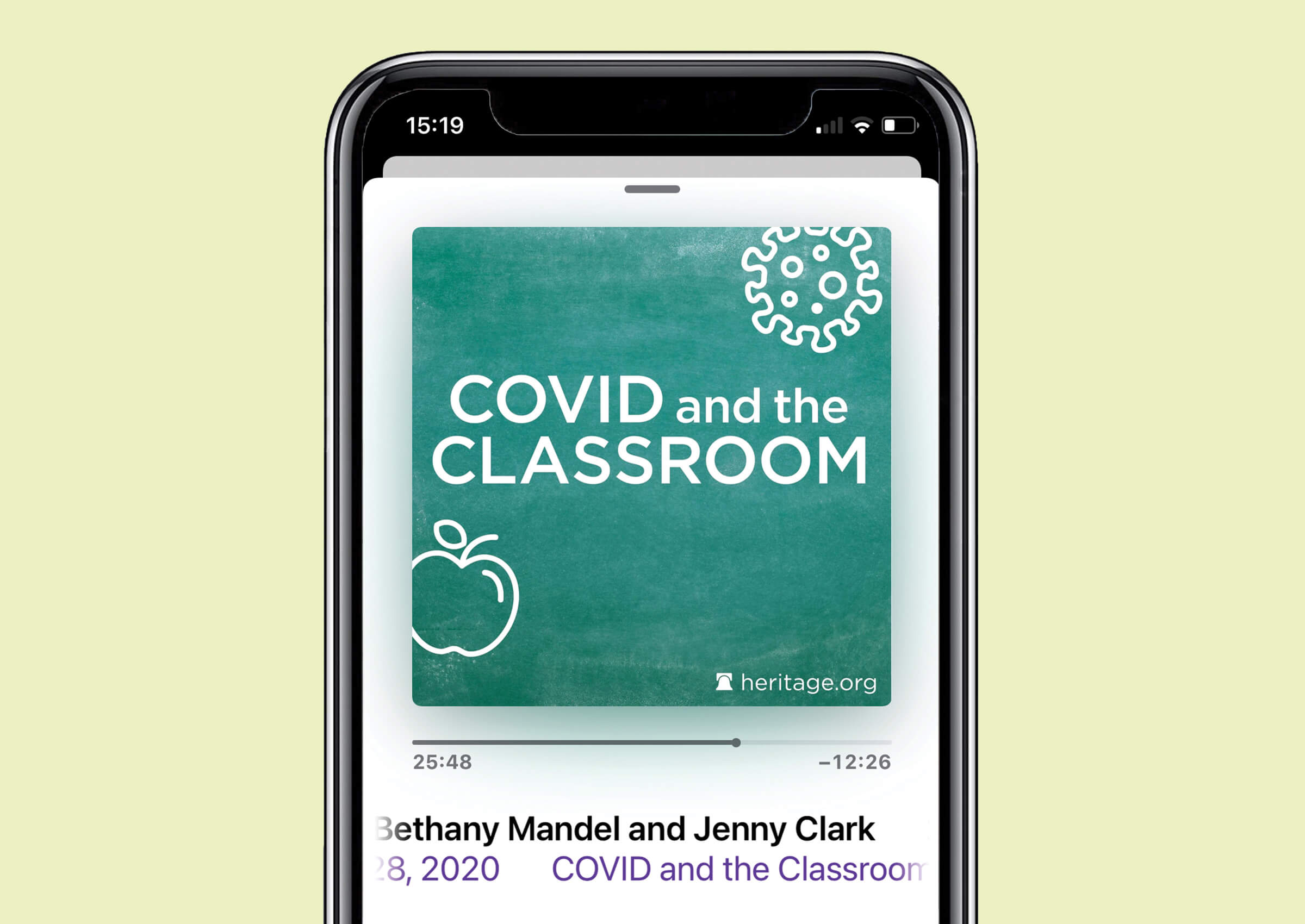Fighting for Lives & Livelihoods
Rising to Meet Unprecedented Challenges

I spent the weekend perusing an early version of the [commission’s] report, and I’m going to be presenting it today to the coronavirus task force here at the White House.


Who deserves credit for the development of a COVID-19 vaccine in less than a year? Or for America’s remarkable economic resilience throughout the crisis?
It belongs to the innovators, the scientists, the doctors, and the many brave Americans on the front lines of the pandemic. And it belongs to you as a Heritage supporter.
The National Coronavirus Recovery Commission
The Trump administration and Congress continually looked to The Heritage Foundation and our National Coronavirus Recovery Commission in their response to COVID-19.
No other commission was focused equally on the public health and economic aspects of the crisis—or had the wide-ranging expertise to do it. The commission consisted of 17 nationally recognized experts in areas such as health care policy, disaster relief, education, business, and civil society.
Working with Heritage experts and a team of medical professionals that we assembled to provide the best expert counsel, the commission produced 265 recommendations.
Our recommendations were delivered to Congress, the Trump administration, state governors, and other allies. We even shared the report with international allies. In June, the commission released its recommendations in a sweeping final report.

We reminded Americans that the battle against COVID-19 takes place at the state and local level, supported, not hindered, by federal government. It is here where common-sense public health measures can save lives. We discouraged broad-based lockdowns and emphasized outreach to the most vulnerable among us.
Instead, we outlined an “all-of-society approach” that activated officials at every level—federal, state, and local, along with economic, civil society, religious, diplomatic, military, homeland security, and national health leaders—to face the greatest challenge of our lifetime.
You can read the full report of 265 recommendations at coronaviruscommission.com.
I spent the weekend perusing an early version of the [commission’s] report, and I’m going to be presenting it today to the coronavirus task force here at the White House.
Developing Vaccines and Treatments
We recommended that the federal government prepurchase large quantities of vaccines. This would enable vaccine makers to build out their manufacturing capacity in advance of clinical trials.
In July, the Department of Health and Human Services announced a contract with Pfizer to purchase 100 million doses of its vaccine. This was followed by contracts for additional vaccines.
The Trump administration also adopted our recommendation to solicit and publicize state vaccination plans.
Cutting Red Tape and Regulations
We were behind the Trump administration’s wave of deregulation, which removed barriers to new tests and treatments. The administration also cut red tape to address America’s economic emergency. Agencies were ordered to rescind, modify, waive, or provide exemptions from regulations and other requirements that slow businesses’ ability to adapt to the pandemic.
We influenced the administration’s deregulation of telemedicine, with these recommendations also being adopted by Congress. This resulted in Medicare patients being able to see doctors virtually across state lines and doctors having freer use of the internet to meet with patients. Heritage is working with Congress in 2021 to make sure these reforms are made permanent.
We called attention to the need to clear away regulatory barriers to rapid self-tests that can be done at home without a prescription. After a briefing from Heritage and Heritage Action for America, President Trump stated his decision to take a step toward rapid self-tests in an announcement in the Rose Garden. We continue to make the case for action on rapid self-tests to Congress and the current administration.

Helping America’s Students
In 2020, we worked with state and local governments and with a coalition of education reform partners to put the focus back on kids. During a crisis like COVID-19 (and at any time), it makes sense to put dollars directly in the hands of families to pay for learning options that are the right fit for their children. Education savings accounts (ESAs) are especially important.
Because of our efforts:
- Utah enacted a state tax credit scholarship that allows children with special needs to attend a private school of their choice.
- South Carolina made its education funds under the CARES Act portable.
- Oklahoma used a portion of funding allocated through the CARES Act to provide ESA-style accounts to families.
- The White House released an executive order permitting Community Service Block Grant funds to be used for ESA-style options for families that don’t have access to in-person learning.
We were also there to provide curriculum, support, and ideas—like classical curriculum and community-based education co-ops or “pods” to help parents struggling to educate their children at home. We promoted our collection of the best online education programs to parents and teachers through a timely Curricula Resource Initiative, which can be found at heritage.org/curricula-resource-initiative.
Preventing State Bailouts
From the start, Congress wanted to give unrestricted funds—essentially, a blank check—to states under the pretext of COVID-19 relief. Fiscally irresponsible states that had mismanaged their budgets for years jumped at this opportunity.
Heritage blew the whistle. We launched a campaign with Heritage Action, state think tanks, and allies across America to oppose state bailouts. Our letters, op-eds, and messaging reached Capitol Hill offices and changed the debate.
As a result, Congress refused to issue a blank check bailout to the states in 2020. In stopping that original $900 billion bailout, we showed that the amount they were requesting was ridiculous—even by the left’s terms.
Federal Relief Packages
We pressed lawmakers to keep federal COVID-19 funding packages targeted and temporary—and to keep leftist priorities like abortion out. For example, we made sure that Hyde Amendment protections (preventing federal funding for elective abortions) didn’t make it into the final draft of the Families First Coronavirus Response Act.
We were especially involved in the CARES Act. CARES was far from perfect, but it was improved with our close involvement.
- Because of Heritage, CARES contained provisions that kept workers connected to their employers, such as business loans, incentives to rehire workers, and delayed tax filings.
- We spotlighted attempts to sneak all-mail voting, same-day voter registration, and other fraud-prone reforms into the bill.
- We gave lie to the claim that Planned Parenthood was an “essential” business and insisted that funding for the abortion giant not be part of CARES and subsequent aid packages.
- We helped prevent the extension of the $600 per week unemployment insurance benefits—a policy that gave unemployed workers more than they would have received from working.
- After working with Heritage, Reps. Ken Buck, R-Colo., and Ted Budd, R-N.C., introduced the “Getting Americans Back to Work Act,” which advances Heritage’s recommended legislative fixes to the problematic $600 unemployment Insurance benefit.
Your Constitutional Rights
We stood up for what is essential during the pandemic and always: your constitutional rights. When governments started issuing orders to stay at home, close businesses, wear masks, and other mandates, we turned our attention to the legal and constitutional issues raised by these orders.
For example, while most states allowed gun stores to continue operating, some others deemed them “nonessential businesses” that must close. We made the case that being able to defend yourself is never more essential than during a time of scarcity and civil unrest. To support Second Amendment rights, throughout 2020, we cataloged and highlighted over 1,000 cases of lawful, defensive gun use through our new, interactive Defensive Gun Use website.
Heritage also stood up for houses of worship to be treated the same as secular businesses and called attention when they were not. And we highlighted the role that faith-based institutions play in helping the needy, the sick, and the vulnerable in their communities, arguing that government should make it easier—not harder—for these institutions to help their communities.
Our legal experts met with congressional and administration officials to talk about election concerns, ways state legislatures could curtail governors’ shutdown powers, distribution of relief aid to states, China’s role in the pandemic, and more.
Shaping the Media Narrative on COVID-19
Heritage dominated media coverage of COVID-19-related issues in 2020.
The media turned to Heritage’s legal scholars more than 70 times for insights into the legal issues surrounding the pandemic. Heritage experts made 139 national and international TV appearances on COVID-19. Our Feb. 20 “Heritage Explains” podcast episode on COVID-19 was our most popular of the year.

Preparing for Future Pandemics
In 2020, the entire Heritage team stepped up to the plate to face the greatest economic and public health challenge of our time. They did it from home—many even did it with children around—and they did it with duty and determination.
We were confronted by an unprecedented challenge—and we assembled world-class expertise, providing reliable recommendations, a clear plan, solid research, and credibility that will help us defend America in the challenges ahead.
You can read an analysis promoting fiscal responsibility both during and after the pandemic in Heritage’s compendium project “COVID-19: Lessons Learned and Path Ahead,” available at heritage.org/coronavirus.
Heritage Member Spotlight
Kathy Toms Follows Her Dreams Up North

Heritage Legacy Society Member Kathy Toms’ life story is the embodiment of what is great about America: No matter where you start out, talent and determination will get you where you want to be.
Toms grew up in a single-parent home in California. She and her siblings moved frequently as her mom struggled to find affordable rentals. Her first job was at a local Taco Bell at age 16.
But Toms was gifted at math. It was only a matter of time before she was doing the bookkeeping at a custom van shop—while still a senior in high school.
After various twists and turns over the ensuing years, Toms ended up in the tiny town of Anchor Point, Alaska (population 1,930). She had $1,200 in the bank, $6,000 in savings, and no job.
But by then she had gained experience as a tax accountant, and she decided to use her experience to start Aurora Taxes. Within a few years, her bustling accounting firm was one of the biggest employers in the area.
When Toms started making her estate plans, The Heritage Foundation ended up on her shortlist of beneficiaries. “I started looking at my core values, and Heritage is fighting for them, and will be long after I’m gone.”